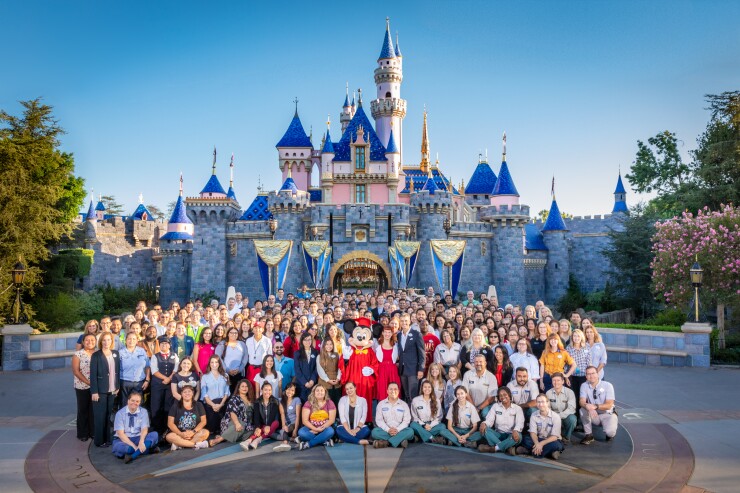When Krista Ledbetter, a global human resources operations associate at the Walt Disney Company, was pursuing her Bachelor’s of Science degree she realized she needed to make a choice: go into debt in order to pay for school or to go to work. She choose to work.
In 2002, she said goodbye to a job she loved as an attraction hostess at Disneyland and ventured out into the business world where she would spend the next 15 years in property management. But it was a career path she didn’t love. So in July 2018 Ledbetter returned to Disney in her current role, but she still hoped she’d be able to pursue her education.
“I was in school previously, but life took me away from college, unfortunately,” Ledbetter says. “It just got to be too expensive, and I just couldn’t do it on my own.”
But now she no longer has to worry about footing the bill for school, thanks to an education benefit Disney launched last August called Disney Aspire. Ledbetter is taking online classes at Delaware-based Wilmington University, to pursue her bachelor’s degree in organizational management at absolutely no cost to her.
Disney Aspire started with a planned investment of $150 million over five years and three universities. To date, the program has grown to include 11 universities, with the University of Arizona being the most recent addition in August.
After only a year, more than 40% of eligible Disney employees have signed up and more than 8,000 have enrolled in the benefit. The program is offered to Disney’s more than 90,000 U.S.-based hourly workers and is 100% tuition paid. Workers never get a bill, and textbooks and other course materials are covered through reimbursement.
“We needed to build something to be not only impactful for employees and their education and their dreams, but we needed to build something that was also going to help address some of the state of education [issues] in America,” says Chris Trout, Walt Disney's vice president of learning and development.
The growing cost of a college education has given birth to the student loan debt crisis, which has grown to over $1.5 trillion as more Americans turn to loans to finance their education. As a result of financial struggles, however, about 51% of college students drop out because they cannot afford the tuition, according to a
The program’s network of schools enables employees to pursue undergraduate and master’s degrees, high school completion, English-language and Spanish-language learning and vocational training. Through a partnership with education benefits provider Guild Education, Aspire program participants receive individual coaching throughout their educational career from the application process to graduation.
“The counselors are wonderful. They do check-ins with you via text; we do video calls and also email,” Ledbetter says. “I can be very candid with my adviser. I’m super comfortable with her and can ask a lot of different questions.”
As an HR associate Ledbetter tells new Disney hires about Aspire, and she says they are excited about the benefit.
“[At first] they don’t understand that there is no catch,” she says. “They all feel that there is something hidden and [ask] ‘What does Disney [get] out of it?’ I say the only thing they want is to support [their employees].”
Employers understand the need for education benefits, and 56% offer their employees tuition assistance, according to data from the Society for Human Resource Management. There are some employers that offer to cover the cost of tuition. For example, Walmart and Discover. Chick-fil-A, Hulu, Lowe’s, McDonald’s and Taco Bell all also announced education benefits last year.
Disney wanted to create something that would have a greater impact on their employees’ lives than a debt repayment program, Trout says. A comprehensive tuition benefit tells the employee the company is willing to invest in their future, even if that future isn’t with Disney. Employees are not required to pursue degrees related to their work with the company.
“If I think about it from a student perspective and an employee perspective, it takes a lot to go back to school,” Trout says. “We are all in on our employees and their career aspirations. We believe education is a huge jumping point to drive that.”






